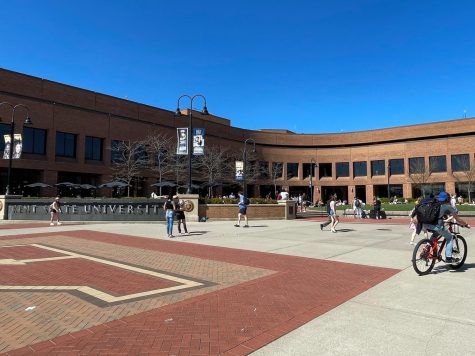KSU keeps above problems on Wall Street
October 6, 2008
Officials watch market closely
Credit: DKS Editors
As Wall Street trembles, shudders and otherwise quavers, Kent State remains unshaken but poised, university financial officials said.
Stock market values dipped sharply amid bank failures last week and since then, Kent State’s finance team has been watching the university’s roughly $150 million worth of shares with increased vigor.
“Yes, our investments are hurting, of course,” President Lester Lefton said. “But we’re still doing better than the S&P because we have some alternative investments that don’t track the stock market.”
| Kent State investments
at a glance: $330 million in total investments. $150 million in equities. $60 million in short-term investments. $120 million in other alternate investments. |
Those alternative investments have kept the university relatively safe, said Gregg Floyd, vice president for finance and administration.
He said tuition won’t rise any more than it would have. And even budget cuts – what Floyd said would be the first line of defense if things turned too sour – aren’t on the horizon.
Even so, university officials are keeping close watch on Kent State’s stocks.
Associate treasurer David Young said he checks share values if not by the hour, then daily.
Fifteen minutes after the House of Representatives passed the $700 billion bailout of the financial system Friday, Young already knew about it and knew the Dow Jones industrial average had already lost almost 200 points.
“It remains to be seen where exactly the market’s going to end up going,” Floyd said.
But Kent State’s ability to cope is less speculative, he said.
Much of the relative security Floyd enjoys comes from measures taken before he started here Sept. 15.
“I’d love to take personal credit for some of the strength that we have, but I’m finishing my third week,” he said. “It does bear testament to the fact that the university has been well-managed financially for a number of years.”
Yank Heisler, special assistant to the president, was interim vice president for finance and administration over the summer. He said Kent State’s financial stability stems from a diverse stock portfolio and ample alternative investments.
Of $330 million in total investments, the Board of Trustees allowed for a maximum of 60 percent to be invested in equities and the rest for less variable alternative investments, such as commodities, or for short-term money markets.
With about $150 million in stocks, Kent State is shy of the 60 percent ceiling but still maintains a healthy risk, Heisler said.
“We could have put everything into money markets, and then we’d be real short-term oriented. We’d have lower returns, but much lower risk,” he said. “Over a long-term, we would have clearly outperformed most because we had a good mix of equities and we created appreciation in our portfolio.”
Floyd said appreciation from better days has helped to make the latest downturn easier.
Other universities are less fortunate.
Colorado Gov. Bill Ritter delayed funds to universities planning taxpayer-supported construction projects. And at Boston University, President Robert Brown froze hiring and halted the progress of all capital projects that don’t already have contracts.
“Fortunately, we don’t have to react overly aggressive because we don’t have the adequate resources to keep going,” Floyd said. “The university has an obligation to deliver a top rate education, and you can’t place that in jeopardy by a knee-jerk reaction to a market change.”
Other colleges found themselves locked out of 90 percent of the cash they kept with Wachovia Bank, which holds money for the nonprofit corporation Commonfund. Those nearly 1,000 schools may have trouble paying salaries.
Brad Staats, interim associate vice president for finance, said Kent State uses Commonfund for about $2 million worth of short-term capital.
“We’ll get all that back eventually, so it’s not hurting our liquidity,” he said. “We have over $60 million in other short-term investments that are fine. It’s not going to affect our ability to make payrolls.”
But Floyd said he and his colleagues aren’t making light of the economic turmoil.
“This is not easy,” he said. “This is something we’re taking very, very seriously. But we have the good fortune of not having to take drastic measures just because we have no choice.”
Contact administration reporter Ben Wolford at [email protected].























